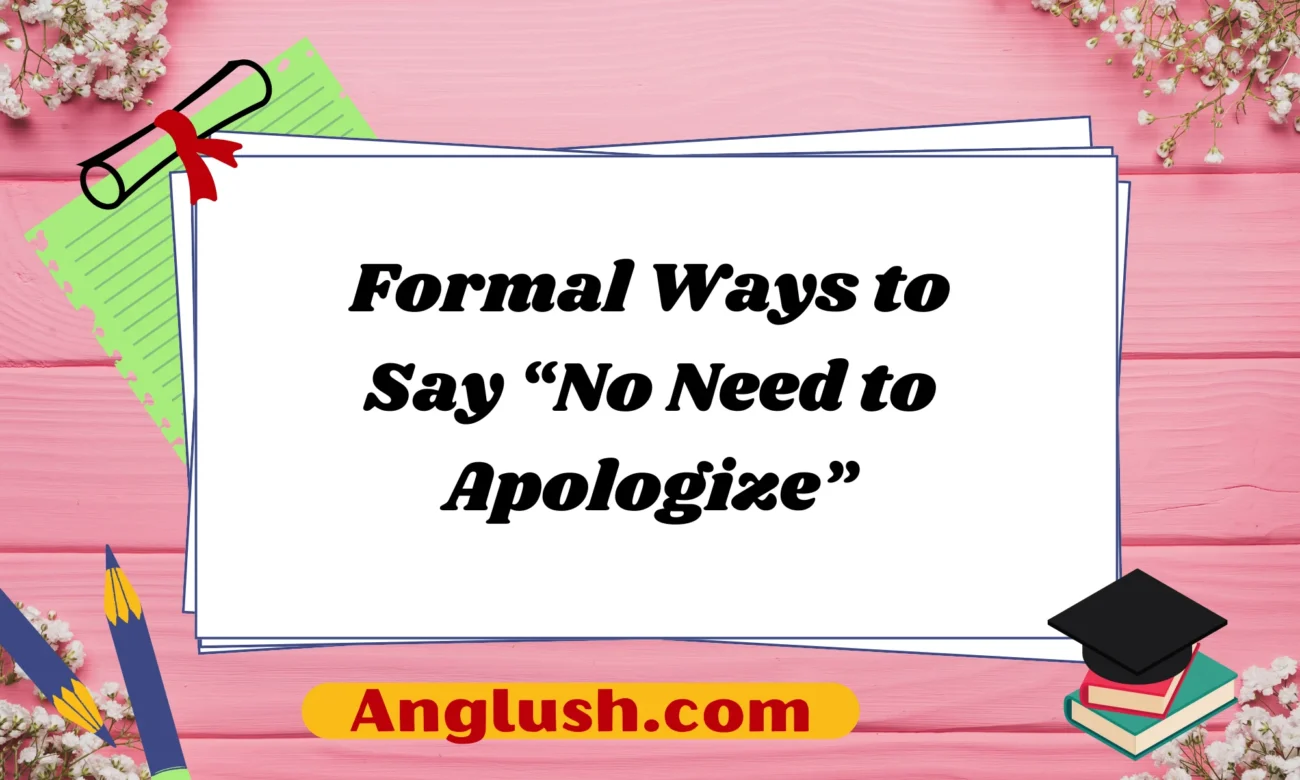Introduction
Apologies are a natural part of communication, whether in personal or professional settings. However, in many situations, an apology may be unnecessary, and responding with kindness and reassurance is the best approach. Instead of simply saying, “No need to apologize,” there are numerous polite, formal, and casual alternatives you can use to maintain a positive tone in conversation.
This article explores 13+ formal ways to say “No need to apologize” while ensuring that your response is professional, courteous, and appropriate for different contexts. You’ll also find 10 user-friendly texting examples that can be used in digital communication.
Why Choose an Alternative to “No Need to Apologize”?
While “No need to apologize” is a polite phrase, there are various reasons why you might want to use a different expression:
- Tone Matters: Some phrases may sound more professional, while others are more casual or reassuring.
- Context Sensitivity: The situation may require a more formal response in a workplace setting or a softer, more personal tone with friends and family.
- Cultural Considerations: Different cultures may have varying expectations regarding apologies and responses.
By selecting the right phrase, you can foster goodwill, maintain professionalism, and enhance your communication skills.
13+ Formal Alternatives to “No Need to Apologize”
1. No Apology Necessary
This phrase is a simple and direct way to reassure someone that their apology isn’t required. It works well in both professional and personal conversations.
Example:
“No apology necessary. I completely understand the situation.”
2. There’s Nothing to Apologize For
This phrase is a reassuring way to let someone know they haven’t done anything wrong.
Example:
“There’s nothing to apologize for. I appreciate your concern, but it’s all good.”
3. No Harm Done
This expression is ideal for casual professional conversations or friendly discussions. It conveys that the situation wasn’t a problem.
Example:
“No harm done at all. Let’s move forward.”
4. No Worries at All
A warm and casual alternative that reassures the speaker that everything is fine.
Example:
“No worries at all! I completely understand.”
5. Please Don’t Worry About It
A kind and considerate phrase that encourages the person not to feel bad.
Example:
“Please don’t worry about it. It wasn’t a problem at all.”
6. It’s Completely Fine
This phrase expresses understanding and helps ease the person’s concern.
Example:
“It’s completely fine, no need to give it another thought.”
7. It’s All Good
A slightly informal but friendly response often used in professional and personal settings.
Example:
“It’s all good. Let’s focus on what’s next.”
8. Think Nothing of It
A more formal way to express that the apology isn’t needed.
Example:
“Think nothing of it. I truly understand.”
9. No Problem at All
This phrase is reassuring and professional, making it ideal for workplace conversations.
Example:
“No problem at all, I understand that things happen.”
10. I Completely Understand
This phrase acknowledges the situation while showing empathy.
Example:
“I completely understand. No need to feel bad about it.”
11. Not an Issue in the Slightest
A formal way to reassure someone that their concern is unnecessary.
Example:
“Not an issue in the slightest. I appreciate your thoughtfulness.”
12. Consider It Forgotten
A polite and formal way to let someone know that the matter is of no concern.
Example:
“Consider it forgotten. No need to feel bad at all.”
13. No Need to Give It Another Thought
A warm and professional phrase that reassures the speaker.
Example:
“No need to give it another thought. Everything is perfectly fine.”
How to Choose the Right Alternative?
The best alternative depends on the context and the relationship you share with the person.
| Scenario | Best Alternative |
| Workplace Email | “No problem at all.” |
| Customer Service Response | “I completely understand.” |
| Casual Conversation | “It’s all good.” |
| Formal Setting | “Think nothing of it.” |
| Reassuring a Friend | “No worries at all.” |
10 User-Friendly Texting Examples
When texting, keeping responses short and polite is key. Here are some variations optimized for texting:
- “No worries at all! Hope you’re doing well.”
- “No harm done. Don’t even think about it!”
- “Totally fine! Let’s move on.”
- “It’s all good! No stress over it.”
- “No need to apologize, seriously!”
- “Not a problem at all. Hope you’re okay.”
- “Consider it forgotten. Everything’s cool.”
- “No problem! We’re all good.”
- “I completely understand, no need to worry.”
- “Don’t even give it another thought!”
Final Thoughts
Saying “No need to apologize” in different ways allows you to communicate with professionalism, warmth, and reassurance. Whether you’re in a formal work setting, a casual chat, or texting, the right phrase helps create a positive and understanding conversation.
Next time someone apologizes unnecessarily, try using one of these alternatives to keep the conversation smooth, friendly, and encouraging.

